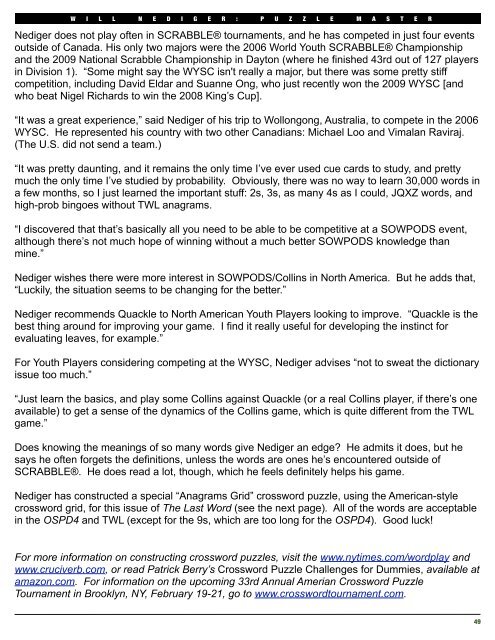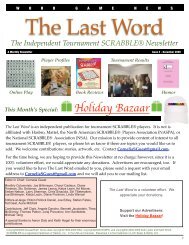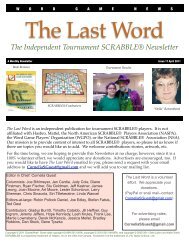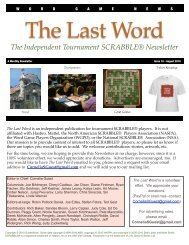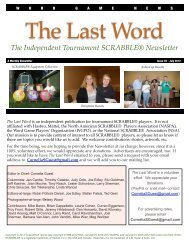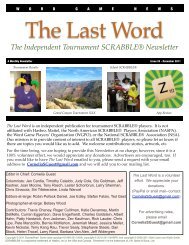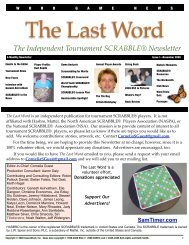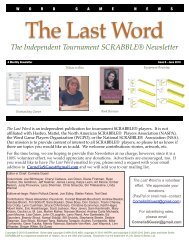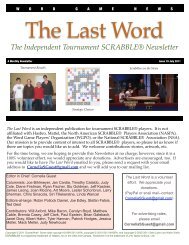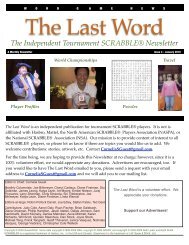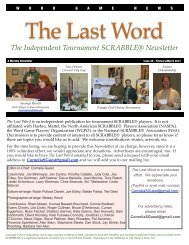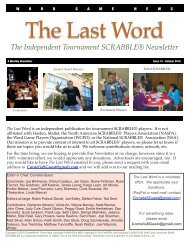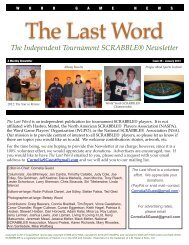February 2010 - The Last Word Newsletter
February 2010 - The Last Word Newsletter
February 2010 - The Last Word Newsletter
Create successful ePaper yourself
Turn your PDF publications into a flip-book with our unique Google optimized e-Paper software.
W I L L N E D I G E R : P U Z Z L E M A S T E RNediger does not play often in SCRABBLE® tournaments, and he has competed in just four eventsoutside of Canada. His only two majors were the 2006 World Youth SCRABBLE® Championshipand the 2009 National Scrabble Championship in Dayton (where he finished 43rd out of 127 playersin Division 1). “Some might say the WYSC isn't really a major, but there was some pretty stiffcompetition, including David Eldar and Suanne Ong, who just recently won the 2009 WYSC [andwho beat Nigel Richards to win the 2008 King’s Cup].“It was a great experience,” said Nediger of his trip to Wollongong, Australia, to compete in the 2006WYSC. He represented his country with two other Canadians: Michael Loo and Vimalan Raviraj.(<strong>The</strong> U.S. did not send a team.)“It was pretty daunting, and it remains the only time I’ve ever used cue cards to study, and prettymuch the only time I’ve studied by probability. Obviously, there was no way to learn 30,000 words ina few months, so I just learned the important stuff: 2s, 3s, as many 4s as I could, JQXZ words, andhigh-prob bingoes without TWL anagrams.“I discovered that that’s basically all you need to be able to be competitive at a SOWPODS event,although there’s not much hope of winning without a much better SOWPODS knowledge thanmine.”Nediger wishes there were more interest in SOWPODS/Collins in North America. But he adds that,“Luckily, the situation seems to be changing for the better.”Nediger recommends Quackle to North American Youth Players looking to improve. “Quackle is thebest thing around for improving your game. I find it really useful for developing the instinct forevaluating leaves, for example.”For Youth Players considering competing at the WYSC, Nediger advises “not to sweat the dictionaryissue too much.”“Just learn the basics, and play some Collins against Quackle (or a real Collins player, if there’s oneavailable) to get a sense of the dynamics of the Collins game, which is quite different from the TWLgame.”Does knowing the meanings of so many words give Nediger an edge? He admits it does, but hesays he often forgets the definitions, unless the words are ones he’s encountered outside ofSCRABBLE®. He does read a lot, though, which he feels definitely helps his game.Nediger has constructed a special “Anagrams Grid” crossword puzzle, using the American-stylecrossword grid, for this issue of <strong>The</strong> <strong>Last</strong> <strong>Word</strong> (see the next page). All of the words are acceptablein the OSPD4 and TWL (except for the 9s, which are too long for the OSPD4). Good luck!For more information on constructing crossword puzzles, visit the www.nytimes.com/wordplay andwww.cruciverb.com, or read Patrick Berry’s Crossword Puzzle Challenges for Dummies, available atamazon.com. For information on the upcoming 33rd Annual Amerian Crossword PuzzleTournament in Brooklyn, NY, <strong>February</strong> 19-21, go to www.crosswordtournament.com. 49


